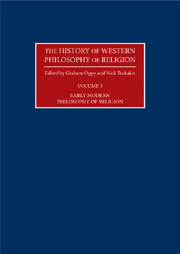Book contents
- Frontmatter
- Contents
- Editorial Introduction
- Contributors
- 1 Early Modern Philosophy of Religion: An Introduction
- 2 Niccolò Machiavelli
- 3 Martin Luther
- 4 John Calvin
- 5 Michel de Montaigne
- 6 Francisco Suárez
- 7 Thomas Hobbes
- 8 René Descartes
- 9 Ralph Cudworth
- 10 Blaise Pascal
- 11 Baruch Spinoza
- 12 John Locke
- 13 Gottfried Wilhelm Leibniz
- 14 George Berkeley
- 15 Voltaire
- 16 The Deists
- 17 Jonathan Edwards
- 18 Thomas Reid
- 19 David Hume
- 20 Denis Diderot
- 21 Immanuel Kant
- 22 Gotthold Ephraim Lessing
- 23 William Paley
- Chronology
- Bibliography
- Index
7 - Thomas Hobbes
- Frontmatter
- Contents
- Editorial Introduction
- Contributors
- 1 Early Modern Philosophy of Religion: An Introduction
- 2 Niccolò Machiavelli
- 3 Martin Luther
- 4 John Calvin
- 5 Michel de Montaigne
- 6 Francisco Suárez
- 7 Thomas Hobbes
- 8 René Descartes
- 9 Ralph Cudworth
- 10 Blaise Pascal
- 11 Baruch Spinoza
- 12 John Locke
- 13 Gottfried Wilhelm Leibniz
- 14 George Berkeley
- 15 Voltaire
- 16 The Deists
- 17 Jonathan Edwards
- 18 Thomas Reid
- 19 David Hume
- 20 Denis Diderot
- 21 Immanuel Kant
- 22 Gotthold Ephraim Lessing
- 23 William Paley
- Chronology
- Bibliography
- Index
Summary
Thomas Hobbes (1588–1679), whose writings span the period of intense political conflict surrounding the English Civil War and Restoration, is best known for the absolutist political theory articulated in his masterwork, Leviathan (1651), and in its earlier incarnations, De cive (The citizen; 1642) and The Elements of Law (1650). Because he thought a proper understanding of religious duty is essential for structuring and maintaining a stable political society, Hobbes devoted an increasing percentage of each of these works to discussion of the profession and practice of Christianity. In addition, Hobbes wrote several works devoted primarily to discussion of religion, including his Latin poem recording the history of religion, Historia ecclesiastica (Ecclesiastical history; 1688), his Historical Narrative Concerning Heresy and the Punishment Thereof (1680); works arguing the compatibility of his views on free will and necessity with Christian doctrine, his Of Libertie and Necessitie a Treatise Wherein all Controversie Concerning Predestination, Election, Free-will, Grace, Merits, Reprobation, etc. Is Fully Decided and Cleared (1654), The Questions concerning Liberty, Necessity, and Chance Clearly Stated and Debated between Dr Bramhall Bishop of Derry, and Thomas Hobbes of Malmesbury (1656) a history of the English civil wars analysed largely as resulting from religious conflict, Behemoth (1679); and some works attempting to defend Hobbes' own piety and doctrines, including Considerations upon the Reputation, Loyalty, Manners, and Religion of Thomas Hobbes of Malmesbury (1662).
- Type
- Chapter
- Information
- The History of Western Philosophy of Religion , pp. 89 - 100Publisher: Acumen PublishingPrint publication year: 2009

